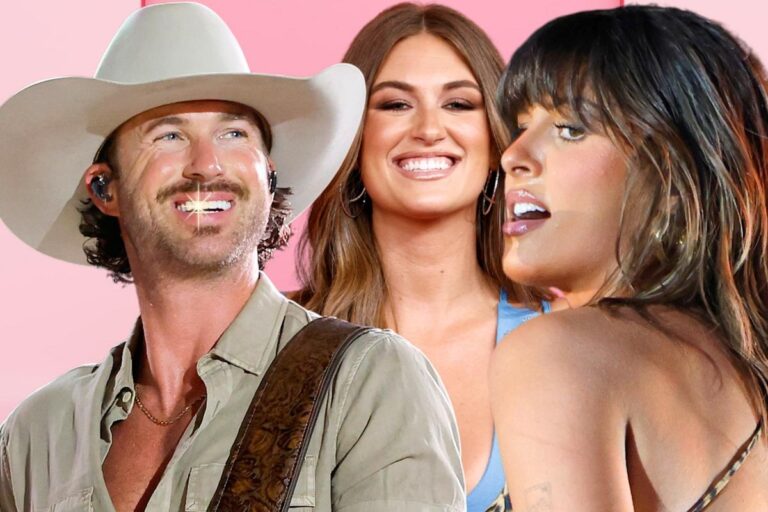By now, it’s customary that whoever is backstage at a Willie Nelson show will join him for the gospel medley he uses to close his performances. On Wednesday at the Franklin, Tennessee, stop of the Outlaw Music Festival tour, that included a pair of unannounced stars: Chris Stapleton and Sheryl Crow, who joined guests including the McCrary Sisters, members of Nathaniel Rateliff’s Night Sweats, Tami Neilson, and Lily Meola to sing along to “I’ll Fly Away.”
Most fans didn’t seem to notice Stapleton or Crow, but there was no missing the music video that played on screens prior to Nelson’s headlining set an hour earlier — or its message. As soon as the lights went dark inside the FirstBank Amphitheater, a former quarry about 28 miles south of Nashville, Nelson’s video for his 1986 song “Living in the Promiseland” sprung to life.
There, projected on a pair of supersized video screens, were images of immigrants, many of them people of color, some on boats, others in food lines, all of them grasping for the increasingly elusive helping hand of America. During the current nightmare that is the United States in 2025, where immigrants are being vilified, pressured to “self-deport,” or, even worse, snatched from their places of employment by masked men and taken to far-off detention centers, the choice to play the music video didn’t feel like an accident. Rather, it was an intentional reminder of what this country once was, and should be again.
“Give us your daily bread/We have no shoes to wear/No place to call our own/Only this cross to bear,” Nelson was shown singing, his forehead wrapped not in his signature red bandanna, but one fleshed out with white stars and stripes. In the decades-old video, Nelson, then only 53, is America, a warm voice and welcoming refuge for those in need. Today, at 92, he remains so, and drives the point home by performing not in front of the Texas state flag as he often did in his younger days, but in front of an enormous American flag that runs the length of the stage. To him, the flag is still for everyone and represents who we are, what we’ll do, and as Bruce Springsteen once sang, “what we won’t.”
It is, as the song says, the embodiment of “The Promiseland.”
“It’s basically, come on: come on to America,” Nelson said of “Living in the Promiseland” in a 2017 interview, during the first Trump administration’s attack on immigrants. “We love you, we’ll help you, we’ll find a spot for you. So, and it sings like, there is the other side who said no, no, no — but that ain’t right.
“I’m still optimistic that all the people are coming in,” Nelson continued, “and it will be as great tomorrow as it is today.”
Written by David Lynn Jones, the song was the title track to Nelson’s 1986 album The Promiseland. Nelson performed it live here and there over the years that followed, but largely retired it in 2005. Ten years later, he revived the tune when he received the Gershwin Prize for Popular Song, at a time when Syrian refugees were fleeing a civil war in their country. “I think this is one of the most appropriate songs that we could do for this period in America,” he said onstage at Constitution Hall in Washington, D.C. “Many years ago, I recorded this song and I felt like this might be a good time to kind of try to bring it back.”
Another 10 years later, “Living in the Promiseland” is worth listening to once again. And while Nelson hasn’t played it live on the Outlaw Music Festival like he did on last year’s tour, he’s making sure its lyrical message — that there’s “room for everyone” in this promised land — is broadcast before he even takes the stage.



